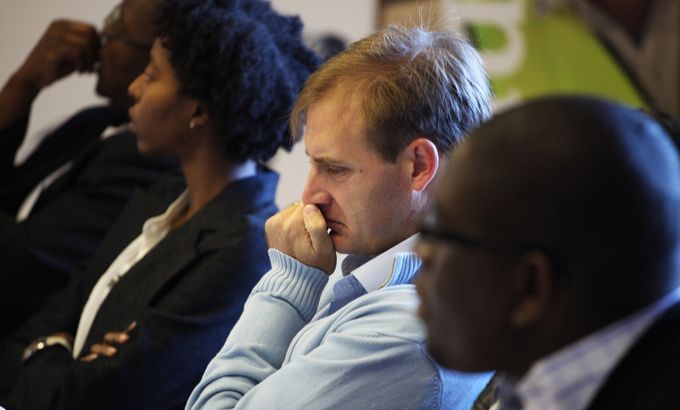
Episode 1: A new moral task force for Africa?
Great leadership may be in short supply but an African experiment championed by Desmond Tutu offers hope for the future.
Twenty-five remarkable young Africans, chosen to be groomed to form a new moral task force, promise to dedicate their talents to transforming the continent.
We need to stop feeling that the world owes us something. If it does owe us something it is not going to pay it to us so I think it makes sense to write it off and move on.
Over the course of six months, they will undergo intensive coaching in South Africa and the UK, and have to show the results of their leadership training on the ground.
Keep reading
list of 4 items‘Mama we’re dying’: Only able to hear her kids in Gaza in their final days
Europe pledges to boost aid to Sudan on unwelcome war anniversary
Birth, death, escape: Three women’s struggle through Sudan’s war
The four-part Tutu’s Children series will follow them as they undertake this journey.
The Archbishop Desmond Tutu Leadership course is uniquely designed to provoke. It is the flagship programme of the not-for-profit African Leadership Institute (AfLI), established in 2003 by retired South African business leaders Sean Lance and Peter Wilson.
Lance was once head of two of the world’s biggest pharmaceutical companies, Chiron Corp and GlaxoSmithKline. And Wilson has previously been responsible for strategy planning for Shell and the United Nations.
They run the annual Tutu Fellowship as volunteers, helped by others who recognise the need for a fresh generation of African leaders.
For these potential leaders, reaching for great heights will mean addressing taboos and facing their inner-most conflicts.For some of the participants in the course it is an experience that will alter their path in life. But among these Tutu’s Children, will we find Africa’s leaders of tomorrow?
Between them, they share 32 post-graduate degrees, eight top corporate jobs, six government positions, seven businesses and six charities.
You become a refugee, you don't know if you're going to live, people you know die, and you just think, I am just lucky actually that I escaped.
For some of them this process is about finding a purpose, while others are searching for unity.
Having accomplished this much as individuals, their challenge now is to share a vision for the continent. So, how hard can it be?
There are some like Lydie Hakizimana, a publishing entrepreneur, who are joining the course as reluctant leaders.
“I’m not someone who likes to make big speeches. But I’ve always found myself in leadership positions. Being an introvert I really have to step up to the challenge,” says Hakizimana.
But they all see it as an opportunity to bring about the change that is required to create a better future for the continent.
Along the way they have heated discussions about a wide range of issues, including gender bias, corruption, democracy and racism.
“You don’t solve inequality by bringing everyone down to the lowest level. You solve it by bringing everyone up to the highest possible level,” explains Marc Van Olst, a private investor.
I don't think African unity can come overnight. But I hope in 10 to 15 years I can say, wow, the Tutu Fellowship accelerated this process.
The fellowship programme is an experiment, with no guarantee of producing the desired results.
Both Lance and Wilson are acutely aware of the dangers of passive societies. And for them, this is about more than inspiring a small elite. They have come to believe that leadership is a universal responsibility.